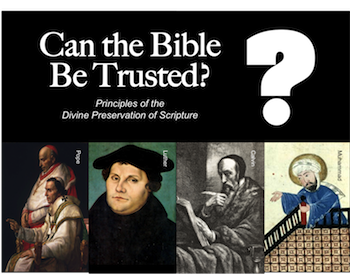Can the Bible Be Trusted? Part 4

In "Can the Bible Be Trusted? Part 3," we looked at two of the principles of Divine preservation of Scripture - God's Protection and God's Prophecy. In this material, we will examine another - God's Priming.
Remember, man cannot be trusted with the greatest message of all time. In order to be sure of God's message, always let the Bible interpret the Bible. Use it in your personal Bible study. Test every preacher, teacher, and church leader by it. Filter all doctrines through it. Let the Bible speak for itself!
Principles of the Divine Preservation of Scripture
#6 God's Priming
As a child, I remember visiting a very old home tucked back in the hills of northwest Pennsylvania. There was an old-fashioned water pump out front and I remember cranking the handle repeatedly but never getting water. My father explained to me that the old well needed priming. It was not that the water source was unavailable or even forgotten. It had just been neglected.
Throughout the centuries, God has repeatedly "primed the well" of Scripture. It has never been unavailable or totally forgotten; it has just been neglected.
One of the most vivid illustrations of the priming principle comes from the story of Josiah and the discovery of the ancient Book of the Law (2 Kings 22). Read the story for yourself and notice the Divine validation that was given to Josiah because he set out to restore, not reform, a renewed commitment to the Law.
In truth, God's priming has occurred at every major event in human history.
- At creation, He walked and talked with Adam and Eve.
- At the flood, He visited Noah and prompted sermons as he built the ark.
- By faith, Abraham left his homeland and was led on a very personal pilgrimage as God re-primed His message and the covenant of redemption.
- Moses grew up at the epicenter of human wisdom, yet God "primed the pump" during the last 80 years of his life when he was far away from human academia.
- John the Baptist certainly was not held in high regard as a refined scholar, yet God used him as a catalyst for a re-priming in time for Christ's ministry.
- Paul was knocked to the ground and blinded on his way to Damascus, then spent time alone in the desert as God primed him to write almost 75% of the New Testament.
- And lastly, it was on the very isolated island of Patmos that the apostle John was given the final inspired priming, Revelation 1:9-10.
Conclusion: Re-priming comes by God's determination and is often separated intentionally from human wisdom in order to emphasize the Source and the Protector of the message which endures forever - God.
How Do We Know?
Q: But how do we know that God doesn't "prime the pump" today with new messages? The Pope certainly claims that right. Joseph Smith, founder of Mormonism claimed that ability. Muhammad believed he was divinely empowered to establish Islam. What evidence is there that these messages aren't providential priming?
First, notice four things about the double curse which is assigned within the words of Galatians 1:6-9. "I am astonished that you are so quickly deserting the one who called you to live in the grace of Christ and are turning to a different gospel- 7 which is really no gospel at all. Evidently some people are throwing you into confusion and are trying to pervert the gospel of Christ. 8 But even if we or an angel from heaven should preach a gospel other than the one we preached to you, let them be under God's curse! 9 As we have already said, so now I say again: If anybody is preaching to you a gospel other than what you accepted, let them be under God's curse!" (NIV)
- Paul considered it astonishing and a desertion of their calling to accept a supplemental gospel.
- Paul says that a supplement of the gospel is "no gospel at all" because it prompts "confusion" and is a perversion of "the gospel of Christ."
- Paul eliminates the possibility of even "an angel from heaven" bringing a true supplement to the gospel.
- Paul emphasizes the grievous nature of a supplemental gospel by assigning a double curse to anyone who played the role of false prophet.
The inspired apostle John also places a curse on those who add to or take away from the words of the Book of Revelation. Revelation 22:18-19 (NIV) "I warn everyone who hears the words of the prophecy of this scroll: If anyone adds anything to them, God will add to that person the plagues described in this scroll. 19 And if anyone takes words away from this scroll of prophecy, God will take away from that person any share in the tree of life and in the Holy City, which are described in this scroll."
But perhaps my favorite illustration is the stubborn persistence of those in Berea. Acts 17:11-12 (NIV) "Now the Berean Jews were of more noble character than those in Thessalonica, for they received the message with great eagerness and examined the Scriptures every day to see if what Paul said was true. 12 As a result, many of them believed, as did also a number of prominent Greek women and many Greek men."
Notice why the Berean Jews were validated by the Holy Spirit as being "of more noble character."
They "examined the Scriptures every day." These were the Divinely preserved writings of the Old Testament. Presumably, the Holy Spirit felt that the preservation of ancient Scripture was pure enough to designate the Bereans "more noble" for using them.
Notice who it was they were holding accountable to these Divinely preserved ancient texts, none other than the former pupil of Gamaliel, the inspired prophet who will go on to write nearly 75% of our New Testament, Paul himself. Not even the apostle Paul was above being judged by the ancient manuscripts of Scripture!
And lest we miss the grand application, notice again the words of verse 12, "As a result, many of them believed, as did also a number of prominent Greek women and many Greek men." Yes, God's priming is effective and can be trusted.
Conclusion
Be noble like the Bereans. Be a person who "correctly handles the words of truth" (2 Timothy 2:15, NIV). Trust in God's power to preserve His Word. In order to be sure of God's message, always let the Bible interpret the Bible
Missed the first three parts of this study? Go to:
Can the Bible Be Trusted? "Part 1"
"Part 2"
"Part 3"
Want to continue this study? Go to:
Can the Bible Be Trusted? "Part 5"
Back to Top of "Can the Bible Be Trusted? Part 4"
Back to The Individual Page
Back to Home Page


